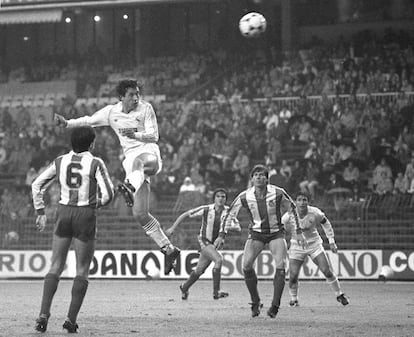Fifty years is nothing

Text in which the author advocates ideas and draws conclusions based on his or her interpretation of facts and data

We make decisions every day, but few are critical enough to shape the rest of our lives. No more than four or five. These days mark the fiftieth anniversary of one of my decisions: arriving in Spain. The chain of consequences of that decision lives on, because I never left this country again.
I took advantage of a professional opportunity that allowed me to escape a turbulent Argentina and land in a promising Spain, both in terms of football, politics, and culture. Two months after my arrival, Franco died , and waking up each day was like reading a new chapter in history. Some of those stories were closed by time, for example, this one: I learned about Spain by reading the newly founded newspaper EL PAÍS, and today it's my turn to be a part of it and write this weekly column.
Time doesn't measure the same when viewed from different ages. When I was a teenager and heard Gardel sing that "twenty years is nothing," it seemed excessive to me. Today, looking back, these fifty years confirm the truth of the same tango: "Life is a breath."
I arrived at Alavés, which was in the Second Division. Vitoria was a cold and rainy city, and I had to learn to play in the mud, something I wasn't prepared for either technically or physically. I was tall and thin (ten kilos lighter than at the end of my career), and my wading-bird legs, which I showed off in low-cut socks, paid dearly for my coquettishness: two broken fibulas. There was a lot of sticking in those days. My muscular system also couldn't hold up, to the point that I had several muscle tears in my first year. I was so fragile that one day I broke it while taking off my pants, a shame only acknowledged today, fifty years later.
At 19, I'd already made my debut with the Argentine national team, so my signing was a solid opportunity to help Alavés get promoted to the First Division . But life isn't that easy, and in that first year, we avoided relegation to the Third Division in the 90th minute of the final match… with a goal from me. I hold that memory with pride, because not failing is as important to honor as succeeding. I thought Alavés would be my springboard to Real Madrid. But to complete that leap, I had to wait ten years and first go through an unforgettable experience in Zaragoza, already in the First Division.
I lived in a hotel, and on long, lonely afternoons I took refuge in reading, a companion that never left me. In my second life, words were as important as the ball was in my first. I never knew if joining Alavés was the best professional decision, but I have no doubt that, personally, it was a period that helped shape and toughen me.
I met my wife in Vitoria, and before I'd put down roots, I was already branching out into children who, now, have given me grandchildren. In fifty years, there's time for good things, very good things, bad things, and very bad things. It's called life. And even though today I have to look back, I've always believed that life is ahead.
I remember a car trip with Alfredo Di Stéfano when, while speeding, he said, half-frightened, "Either we're going too fast, or the towns are too close." Just as quickly, I see the footballer, the coach, the manager, the communicator, the speaker pass by... always with one foot firmly in the spotlight, my passion and my celebration.
Today I feel 100% Argentine and 100% Spanish. I know that if Milei read this, she'd take away some of my Argentinian identity for having left, and that Abascal would take away my Spanish identity for having stayed. But what can you do?

Jorge Valdano is a columnist for EL PAÍS and a commentator for Mediapro for Movistar. A former soccer player, he won a World Cup with Argentina in 1986 and was also a coach. He held two positions as sporting director and general manager of Real Madrid, where he was also a player and coach. He has written several books.
EL PAÍS




